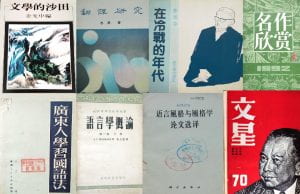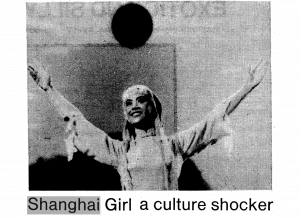Master of Arts Program in the Humanities
Reconstituting the Japanese Housewife: Idemitsu Mako’s Charged Televisual Fields in Kiyoko’s Situation (1989)
Arts and Politics of East Asia (APEA) & Visual and Material Perspectives on East Asia (VMPEA)
★ Co-Sponsored Workshop ★
Registration link:
https://uchicago.zoom.us/meeting/register/tJcsdOurqj4tGt2anbWtlJneaklgRPm9JkS0

Idemitsu Mako, Kiyoko’s Situation, 1989, video, color, sound, 24:40 min, (still of) 17:10.
Abstract:
Subverting the housewife melodrama form, Idemitsu Mako’s shufu (housewife) series (1972-1989) deftly manifests the radical potential of a domestic television set to reconfigure the shufu’s subconscious. Placidly observing the austere environment of the household, Idemitsu’s televisual videos frame her shufu protagonists and the television set within the seemingly un-intruded domestic space, allowing for their repressed subconscious to emerge through the television’s charged field.
This paper provides a centripetal tracking (Joselit, After Art) of Kiyoko’s Situation (1989), Idemitsu’s penultimate televisual video work, in which Kiyoko (the protagonist) is compelled by the television set to confront the trauma of being a shufu. Through the unravelling of her past and psyche (exemplified in the television set and Kiyoko concurrently), we witness how the television set reconstitutes Kiyoko’s subjecthood, no longer just a conduit for mediation or transmission.
This paper considers the viability of extant Euro-American video art narratives to account for and explicate Idemitsu’s practice, consulting Thomas Lamarre’s notion of the technosocial charged field to expand upon the work’s medium and socio-political context. Specifically, the paper suggests why it is crucial to consider both media and cultural specificity in Idemitsu’s form of media art, reconciling how a media ecology might consider the discrete objecthood of domestic television sets. The paper proposes that Idemitsu’s televisual videos formulate a media art practice that envisages the media effects of television, while concurrently activating her feminist ideology.
Presenter: Toby Wu (he/him/his) is a Master’s candidate at the University of Chicago reading Art History and Media Studies. He is interested in the emergence of time based media practices in the Global Contemporary, specifically through Transpacific exchanges between Japan, Southeast Asia, and the United States of America. His Master’s thesis examined Idemitsu Mako’s techno-social reconstitution of the Japanese housewife’s subjecthood through the media effects of television. Toby is an inaugural (2021) Asia Art Archive in America & PoNJA GenKon fellow and the Graduate Curatorial Intern for Transpacific Art Histories at The Smart Museum. He has previously worked with KADIST Art Foundation (San Francisco), National Gallery Singapore and Museum of Contemporary Art and Design (Manila).
Respondent: Thomas Lamarre is a scholar of media, cinema and animation, intellectual history and material culture, with projects ranging from the communication networks of 9th century Japan (Uncovering Heian Japan: An Archaeology of Sensation and Inscription, 2000), to silent cinema and the global imaginary (Shadows on the Screen: Tanizaki Jun’ichirō on Cinema and Oriental Aesthetics, 2005), animation technologies (The Anime Machine: A Media Theory of Animation, 2009) and on television infrastructures and media ecology (The Anime Ecology: A Genealogy of Television, Animation, and Game Media, 2018). Current projects include research on animation that addresses the use of animals in the formation of media networks associated with colonialism and extraterritorial empire, and the consequent politics of animism and speciesism.
His work as a translator includes major works from Japanese and French: Kawamata Chiaki’s novel Death Sentences (University of Minnesota, 2012); Muriel Combes’s Gilbert Simondon and the Philosophy of the Transindividual (MIT, 2012); and David Lapoujade’s William James: Pragmatism and Empiricsm (Duke University Press, 2019).
He has also edited volumes on cinema and animation, on the impact of modernity in East Asia, on pre-emptive war, and formerly, as Associate Editor of Mechademia: An Annual Forum for Anime, Manga, and the Fan Arts, a number of volumes on manga, anime, and fan cultures. He is co-editor with Takayuki Tatsumi of a book series with the University of Minnesota Press entitled “Parallel Futures,” which centers on Japanese speculative fiction. Current editorial work includes a co-edited volume on Chinese animation with Daisy Yan Du and a co-edited volume on Digital Animalities with Jody Berland.
He previously taught in East Asian Studies and Communications Studies at McGill University. As James McGill Professor Emeritus of Japanese Media Studies at McGill University, he continues to work with the Moving Image Research Laboratory, funded by the Canadian Foundation for Innovation, and partnered by local research initiatives such as Immediations, Hexagram, and Artemis.



